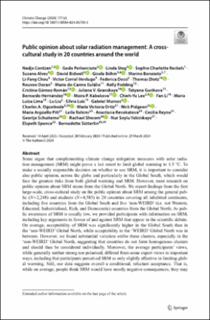Please use this identifier to cite or link to this item:
https://doi.org/10.21256/zhaw-30733| Publication type: | Article in scientific journal |
| Type of review: | Peer review (publication) |
| Title: | Public opinion about solar radiation management : a cross-cultural study in 20 countries around the world |
| Authors: | Contzen, Nadja Perlaviciute, Goda Steg, Linda Reckels, Sophie Charlotte Alves, Susana Bidwell, David Böhm, Gisela Bonaiuto, Marino Chou, Li-Fang Corral-Verdugo, Victor Dessi, Federica Dietz, Thomas Doran, Rouven Eulálio, Maria do Carmo Fielding, Kelly Gómez-Román, Cristina Granskaya, Juliana V. Gurikova, Tatyana Hernández, Bernardo Kabakova, Maira P. Lee, Chieh-Yu Li, Fan Lima, Maria Luísa Liu, Lu Luís, Sílvia Muinos, Gabriel Ogunbode, Charles A. Ortiz, María Victoria Pidgeon, Nick Pitt, Maria Argüello Rahimi, Leila Revokatova, Anastasia Reyna, Cecilia Schuitema, Geertje Shwom, Rachael Yalcinkaya, Nur Soylu Spence, Elspeth Sütterlin, Bernadette |
| et. al: | No |
| DOI: | 10.1007/s10584-024-03708-3 10.21256/zhaw-30733 |
| Published in: | Climatic Change |
| Volume(Issue): | 177 |
| Issue: | 4 |
| Page(s): | 65 |
| Issue Date: | 29-Mar-2024 |
| Publisher / Ed. Institution: | Springer |
| ISSN: | 0165-0009 1573-1480 |
| Language: | English |
| Subjects: | Climate engineering; Public opinion; Perceived risk; Perceived benefit; Perceived justice; Technology acceptance |
| Subject (DDC): | 363: Environmental and security problems |
| Abstract: | Some argue that complementing climate change mitigation measures with solar radiation management (SRM) might prove a last resort to limit global warming to 1.5 °C. To make a socially responsible decision on whether to use SRM, it is important to consider also public opinion, across the globe and particularly in the Global South, which would face the greatest risks from both global warming and SRM. However, most research on public opinion about SRM stems from the Global North. We report findings from the first large-scale, cross-cultural study on the public opinion about SRM among the general public (N=2,248) and students (N=4,583) in 20 countries covering all inhabited continents, including five countries from the Global South and five ‘non-WEIRD’ (i.e. not Western, Educated, Industrialised, Rich, and Democratic) countries from the Global North. As public awareness of SRM is usually low, we provided participants with information on SRM, including key arguments in favour of and against SRM that appear in the scientific debate. On average, acceptability of SRM was significantly higher in the Global South than in the ‘non-WEIRD’ Global North, while acceptability in the ‘WEIRD’ Global North was in between. However, we found substantial variation within these clusters, especially in the ‘non-WEIRD’ Global North, suggesting that countries do not form homogenous clusters and should thus be considered individually. Moreover, the average participants’ views, while generally neither strong nor polarised, differed from some expert views in important ways, including that participants perceived SRM as only slightly effective in limiting glob al warming. Still, our data suggests overall a conditional, reluctant acceptance. That is, while on average, people think SRM would have mostly negative consequences, they may till be willing to tolerate it as a potential last resort to fight global warming, particularly if they think SRM has only minor negative (or even positive) impacts on humans and nature. |
| URI: | https://digitalcollection.zhaw.ch/handle/11475/30733 |
| Fulltext version: | Published version |
| License (according to publishing contract): | CC BY 4.0: Attribution 4.0 International |
| Departement: | School of Engineering |
| Organisational Unit: | Institute of Sustainable Development (INE) |
| Appears in collections: | Publikationen School of Engineering |
Files in This Item:
| File | Description | Size | Format | |
|---|---|---|---|---|
| 2024_Contzen-etal_Public-opinion-about-solar-radiation-management.pdf | 3.47 MB | Adobe PDF |  View/Open |
Show full item record
Contzen, N., Perlaviciute, G., Steg, L., Reckels, S. C., Alves, S., Bidwell, D., Böhm, G., Bonaiuto, M., Chou, L.-F., Corral-Verdugo, V., Dessi, F., Dietz, T., Doran, R., Eulálio, M. d. C., Fielding, K., Gómez-Román, C., Granskaya, J. V., Gurikova, T., Hernández, B., et al. (2024). Public opinion about solar radiation management : a cross-cultural study in 20 countries around the world. Climatic Change, 177(4), 65. https://doi.org/10.1007/s10584-024-03708-3
Contzen, N. et al. (2024) ‘Public opinion about solar radiation management : a cross-cultural study in 20 countries around the world’, Climatic Change, 177(4), p. 65. Available at: https://doi.org/10.1007/s10584-024-03708-3.
N. Contzen et al., “Public opinion about solar radiation management : a cross-cultural study in 20 countries around the world,” Climatic Change, vol. 177, no. 4, p. 65, Mar. 2024, doi: 10.1007/s10584-024-03708-3.
CONTZEN, Nadja, Goda PERLAVICIUTE, Linda STEG, Sophie Charlotte RECKELS, Susana ALVES, David BIDWELL, Gisela BÖHM, Marino BONAIUTO, Li-Fang CHOU, Victor CORRAL-VERDUGO, Federica DESSI, Thomas DIETZ, Rouven DORAN, Maria do Carmo EULÁLIO, Kelly FIELDING, Cristina GÓMEZ-ROMÁN, Juliana V. GRANSKAYA, Tatyana GURIKOVA, Bernardo HERNÁNDEZ, Maira P. KABAKOVA, Chieh-Yu LEE, Fan LI, Maria Luísa LIMA, Lu LIU, Sílvia LUÍS, Gabriel MUINOS, Charles A. OGUNBODE, María Victoria ORTIZ, Nick PIDGEON, Maria Argüello PITT, Leila RAHIMI, Anastasia REVOKATOVA, Cecilia REYNA, Geertje SCHUITEMA, Rachael SHWOM, Nur Soylu YALCINKAYA, Elspeth SPENCE und Bernadette SÜTTERLIN, 2024. Public opinion about solar radiation management : a cross-cultural study in 20 countries around the world. Climatic Change. 29 März 2024. Bd. 177, Nr. 4, S. 65. DOI 10.1007/s10584-024-03708-3
Contzen, Nadja, Goda Perlaviciute, Linda Steg, Sophie Charlotte Reckels, Susana Alves, David Bidwell, Gisela Böhm, et al. 2024. “Public Opinion About Solar Radiation Management : A Cross-Cultural Study in 20 Countries around the World.” Climatic Change 177 (4): 65. https://doi.org/10.1007/s10584-024-03708-3.
Contzen, Nadja, et al. “Public Opinion About Solar Radiation Management : A Cross-Cultural Study in 20 Countries around the World.” Climatic Change, vol. 177, no. 4, Mar. 2024, p. 65, https://doi.org/10.1007/s10584-024-03708-3.
Items in DSpace are protected by copyright, with all rights reserved, unless otherwise indicated.